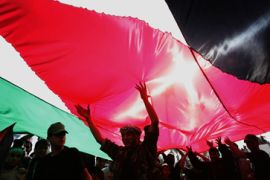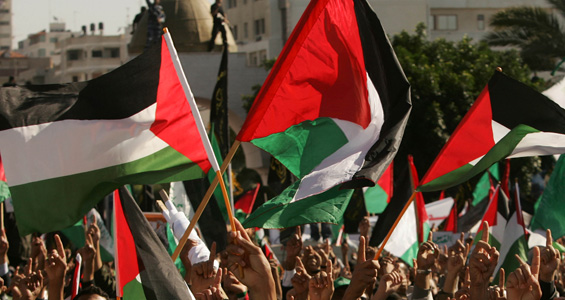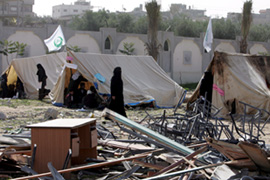‘Last chance’ for Palestinian talks
Stakes are high for Gazans as rival factions prepare to resume Cairo negotiations.

 |
| Political divisions have scuppered hopes for Palestinian unity [GALLO/GETTY] |
There is an air of pessimism on the streets of Gaza as leaders from the Palestinian factions, bitterly divided, head back to Cairo for what many describe as “last chance” talks for national reconciliation.
For nearly three years, since Hamas won what were widely hailed as free and fair elections, world powers have turned their backs on the outcome of the Palestinian democratic process.
And since then Palestinian factions, mainly Fatah and Hamas, have been at odds.
The two factions have entered and fallen out of power-sharing agreements, formed and dismantled national unity governments and fought bitter street battles that have killed or injured hundreds of people.
Hamas has wrested complete control of the Gaza Strip, while Fatah rules in the West Bank.
The divisions have sharply divided the Palestinian people, but in Gaza particularly those divisions have meant a real deterioration in the quality of life.
Gaza’s population is reeling from a devastating Israeli war that killed over a thousand people, while living under an Israeli-imposed siege that restricts the movement of people and goods into a territory in dire need of economic resuscitation.
Now the international community says Gaza’s way forward is through national reconciliation between the major factions.
Reconcile and you will be rewarded, the factions are told. Put aside your differences and you will receive billions of dollars in reconstruction money to rebuild your schools, your mosques, your hospitals, your homes and your lives.
So at the end of the war, the various factions – under international pressure and facing the apathy of Palestinians convinced that their cause for liberation has been derailed by division and political paralysis – decided once again to embark on national reconciliation talks.
‘Comprehensive’ talks
To date, these negotiations, co-ordinated by Egypt, have been the most intensive, and what makes them different is their so-called comprehensive approach.
It means national reconciliation talks this time include all of the main factions, not just Hamas and Fatah.
Then there are five committees to address the supposedly irreconcilable differences. They are:
- The Palestinian Liberation Organisation (PLO) committee: It has been given the responsibility of figuring out a way to reform the PLO and incorporate influential factions.
- The government programme committee: It seeks to define the agenda of the interim government to be formed in line with the national reconciliation agreement, up until the holding of the next elections.
- The security committee: It aims to integrate the various security agencies and forces loyal to the rival factions into one unified apparatus.
- The reconciliatory committee: charged with developing a programme that would help heal the wounds of the bitter division on the Palestinian street.
- The elections committee. Aimed at preparing for, and carrying out, the next round of Palestinian presidential and legislative elections.
The guiding principle for these committees is simple – there can be no comprehensive national reconciliation without an agreement on all committees.
Reaching agreement on all but one of the committees would mean failure of the talks.
Differences of opinion
Where the talks stand on the eve of what many factions describe as the decisive round, depends on where you sit at the negotiating table.
It is not about just solving practical disagreements. There are fundamental ideological differences that are irreconcilable, Khalil el-Heya, a Hamas politician, believes.
El-Heya is not optimistic that national reconciliation is achievable at this stage.
“The rival faction Fatah has aligned itself with the natural enemies of the Palestinian people, including the European Union, the US and Israel,” he told Al Jazeera.
 |
| Gaza’s population is still reeling from Israel’s devastating war on the territory [EPA] |
He said the talks will fail because “they want us [Hamas] to recognise Israel and accept the demands of the International Quartet”, referring to the informal grouping of representatives from the US, the EU, the UN and Russia trying to end the Middle East conflict.
For el-Heya, the success of the talks depends on the outside powers that have shunned Hamas and that are pushing for national reconciliation and elections.
“What guarantees do we have that if we agree to national reconciliation and decide to hold elections – and win those elections like we did three years ago – that this time the international community will recognise our right to govern?”
El-Heya believes it is a lose-lose situation for Hamas – enter into a national reconciliation agreement that calls for elections, and Hamas runs the risk of losing seats in the parliament and ultimately its legitimate claim to power.
But if it wins, it may just find itself cast aside once again by the international community, only to watch its people continue to suffer under the Israeli siege.
‘Accepting and respecting’
In his first interview since the end of Israel’s war on Gaza, Mohammad el-Hindi, the leader of Islamic Jihad, said the biggest difference between factions is that difference between “accepting and respecting”.
Speaking from an undisclosed location in Gaza, el-Hindi told Al Jazeera: “Fatah wants a national consensus government born out of these talks to accept previous agreements signed between Israel and the PLO.
“Hamas won’t accept that, but says any government will respect them.”
It is an ideological difference neither is willing to concede.
“The Palestinian President Mahmoud Abbas’s demand that an incoming government accept previous agreements is wrong. Respecting previous agreements is sufficient for this transitional period up until the elections,” el-Hindi says.
But Marwan Abdel Hamid, a senior adviser to Abbas, disagrees.
“You can’t be elected into the Palestinian Authority, and then turn around and not recognise the fundamental international agreements that created the Palestinian Authority,” he said.
“A child can’t turn around and deny their mother. That’s what Hamas is doing by not recognising previous agreements.”
All or nothing
Furthermore, deciding how to actually carry out the elections has also been contentious.
Hamas wants 50 per cent of the seats in legislative elections assigned by proportional representation, and the other 50 per cent assigned by party lists that meet a specific threshold of votes received.
In this, Hamas is the odd man out. The other factions want seats assigned by 100 per cent direct proportional representation, creating a more pluralistic body.
Hamas is concerned this will give smaller factions greater influence in the formation of governments and policies.
In the end, every committee is linked to the other. The “all or nothing” approach means the stakes could not be higher for the Palestinian people.
“If these talks fail, the reality on the ground will be set in permanently,” el-Heya cautions.
“It will be impossible to carry out elections or reconciliation, and every faction will be in control of what it wants.”
It will be a sad day for Palestinians, but one that many in Gaza expect is not far off.